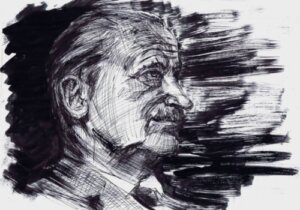Understanding Heidegger


Written and verified by the philosopher Matias Rizzuto
Martin Heidegger (1889-1976) is considered to have been one of the most important thinkers of the 20th century. In fact, his ideas have had a great influence on contemporary philosophy and psychology. His main investigations revolved around our relationship with the world and our awareness of death. Today, his prolific work continues to captivate contemporary thinkers.
However, understanding Heidegger’s philosophy isn’t easy, since his language is often extremely obscure. That said, clarifying some of his concepts will provide a clearer vision of his view of human life and associated questions. Next, we’ll present some guidelines for better understanding his thinking.
1. Ontology and phenomenology
To understand Heidegger’s thoughts, we must take into account that his philosophy was heir to Edmund Husserl’s phenomenology. Phenomenology is a philosophical method that takes into account the existence of objects in relation to the way in which we perceive them, and not as separate entities.
According to Heidegger, the different branches of science study being as an entity, and thus don’t reach a full understanding of it. Ontology is a philosophical discipline that studies the being of things. It uses the phenomenological method to find the real meaning of being. It claims that to reach a true understanding of ‘what-is’, we must think of things and ourselves as interrelated, and not separate from the rest.

2. Dasein and anguish
Dasein was one of the most important concepts of Martin Heidegger’s philosophy. The term, which comes from German can be translated as ‘being there’ or ‘being in the world’. It refers to human existence. According to Heidegger, dasein has a unique relationship with the world. Through its existence, it realizes its own finiteness.
Heidegger argued that dasein is different from other beings in the world in that it has the capacity to understand and care about its own existence. Dasein is aware of its own finiteness. This generates concern or anguish at the possibility of death. It’s an essential characteristic of our constitution as humans. In fact, it distinguishes us from other beings in the world.
Dasein is also aware of its existence in relation to the world and other beings. In effect, it’s aware of its situation in the world. This awareness is what Heidegger called ‘being in the world.’ It’s essential to understanding our fundamental concern with finitude and death.
3. Being and time
In his main work, Being and Time, Heidegger distinguished between time as an ontological criterion (temporariness) and the time of entities (temporality) or the duration of things (measurable time).
Heidegger believed that time in the ontological sense isn’t something that begins and ends. It has a temporal quality that makes it possible for things to exist (temporariness). Temporality is exhibited as a condition of dasein and the possibility of being able ‘to be’, in time. Unraveling this quality is the fundamental work of ontology since it’s there that the structure of being is found.
“Temporality temporalizes as a future which makes present in the process of having been.”
-Martin Heidegger-

4. The oblivion of being
The distressing condition that human beings experience when they become aware of their finiteness pushes them to live in what Heidegger defines as ‘having-been’. It means the past becomes the present. Dasein tends to get lost in everyday things, such as work, social relationships, and recreational activities. It forgets to care for its own existence and its relationship with the world.
For Heidegger, this tendency leads us to live in an inauthentic way. It means we conform to the expectations and values of a world predetermined by the past, plunging us into tedium and boredom.
To escape from this condition, we have to rediscover our own authenticity. We must awaken a temperament that enables us to face anguish and unfold the fundamental metaphysical questions about our existence.
5. Heidegger and technology
According to Heidegger, technology hides the true meaning of being, since it can’t be reduced to observable entities. Technology not only hides being but also the very meaning of our own existence. In fact, it’s responsible for catapulting us into lives lacking in authenticity.
Technology helps science to categorize entities and isolate them from our relationship with them. For example, say you see an open book in a room. When you look at it, you don’t see ink marks on paper, but an object that has a certain meaning for you. However, if you were to introduce an individual from a culture without literature, to the same book, it’s highly likely that they wouldn’t see the same object as you.
In the same way, the being can’t be reduced to the sum of its parts. Its essence ends up being completed in relation to what surrounds it. Moreover, it acquires meaning through the perception of subjects.

6. Heidegger and the poets
According to Heidegger, poetry is a way of thinking that goes far beyond logic and reason. For the thinker, poetic expression helps them gain a clearer and deeper understanding than that expounded by science and philosophy.
Poets, being sensitive, manage to capture the essence of being. They express it in a metaphorical way that transcends mere technical description. It should be noted that the poetry Heidegger refers to is represented by renowned German poets such as Hölderlin, Rilke, Trakl, and Celan.
7. Political controversies
Heidegger was a member of the Nazi party between 1933 and 1945. This fact has led many to question the validity of his thoughts. That’s because they maintain that his philosophy could be said to be compatible with one of the most atrocious political processes in history.
On the other hand, there are those who defend his philosophy. They argue that his ideas aren’t related to the political inclinations that the author sustained throughout his life. Moreover, they claim that his adherence to the Nazi party was strategic.
It should be noted that, unlike many contemporary German intellectuals, Heidegger never apologized for his support of the Nazi regime. In 2014, a series of documents called the black books were published. They explicitly demonstrated his adherence to Nazism and his anti-Semitic ideas.
An influential philosopher
Undoubtedly, we can’t put Heidegger’s thoughts aside when it comes to understanding 20th-century philosophy. Despite the political controversies that surrounded him, his ideas have had a great influence on many later thinkers. For example, Jean-Paul Sartre, Michel Foucault, Peter Sloterdijk, and also psychiatrists such as Medard Boss.
On the other hand, his detractors accuse him of using obscure and ambiguous language, which can easily lead to fallacies and misleading definitions. Despite these criticisms, it’s difficult to ignore a thinker like Heidegger. Indeed, he’ll surely continue to be of great influence to those who want to delve into the world of contemporary philosophy.
Martin Heidegger (1889-1976) is considered to have been one of the most important thinkers of the 20th century. In fact, his ideas have had a great influence on contemporary philosophy and psychology. His main investigations revolved around our relationship with the world and our awareness of death. Today, his prolific work continues to captivate contemporary thinkers.
However, understanding Heidegger’s philosophy isn’t easy, since his language is often extremely obscure. That said, clarifying some of his concepts will provide a clearer vision of his view of human life and associated questions. Next, we’ll present some guidelines for better understanding his thinking.
1. Ontology and phenomenology
To understand Heidegger’s thoughts, we must take into account that his philosophy was heir to Edmund Husserl’s phenomenology. Phenomenology is a philosophical method that takes into account the existence of objects in relation to the way in which we perceive them, and not as separate entities.
According to Heidegger, the different branches of science study being as an entity, and thus don’t reach a full understanding of it. Ontology is a philosophical discipline that studies the being of things. It uses the phenomenological method to find the real meaning of being. It claims that to reach a true understanding of ‘what-is’, we must think of things and ourselves as interrelated, and not separate from the rest.

2. Dasein and anguish
Dasein was one of the most important concepts of Martin Heidegger’s philosophy. The term, which comes from German can be translated as ‘being there’ or ‘being in the world’. It refers to human existence. According to Heidegger, dasein has a unique relationship with the world. Through its existence, it realizes its own finiteness.
Heidegger argued that dasein is different from other beings in the world in that it has the capacity to understand and care about its own existence. Dasein is aware of its own finiteness. This generates concern or anguish at the possibility of death. It’s an essential characteristic of our constitution as humans. In fact, it distinguishes us from other beings in the world.
Dasein is also aware of its existence in relation to the world and other beings. In effect, it’s aware of its situation in the world. This awareness is what Heidegger called ‘being in the world.’ It’s essential to understanding our fundamental concern with finitude and death.
3. Being and time
In his main work, Being and Time, Heidegger distinguished between time as an ontological criterion (temporariness) and the time of entities (temporality) or the duration of things (measurable time).
Heidegger believed that time in the ontological sense isn’t something that begins and ends. It has a temporal quality that makes it possible for things to exist (temporariness). Temporality is exhibited as a condition of dasein and the possibility of being able ‘to be’, in time. Unraveling this quality is the fundamental work of ontology since it’s there that the structure of being is found.
“Temporality temporalizes as a future which makes present in the process of having been.”
-Martin Heidegger-

4. The oblivion of being
The distressing condition that human beings experience when they become aware of their finiteness pushes them to live in what Heidegger defines as ‘having-been’. It means the past becomes the present. Dasein tends to get lost in everyday things, such as work, social relationships, and recreational activities. It forgets to care for its own existence and its relationship with the world.
For Heidegger, this tendency leads us to live in an inauthentic way. It means we conform to the expectations and values of a world predetermined by the past, plunging us into tedium and boredom.
To escape from this condition, we have to rediscover our own authenticity. We must awaken a temperament that enables us to face anguish and unfold the fundamental metaphysical questions about our existence.
5. Heidegger and technology
According to Heidegger, technology hides the true meaning of being, since it can’t be reduced to observable entities. Technology not only hides being but also the very meaning of our own existence. In fact, it’s responsible for catapulting us into lives lacking in authenticity.
Technology helps science to categorize entities and isolate them from our relationship with them. For example, say you see an open book in a room. When you look at it, you don’t see ink marks on paper, but an object that has a certain meaning for you. However, if you were to introduce an individual from a culture without literature, to the same book, it’s highly likely that they wouldn’t see the same object as you.
In the same way, the being can’t be reduced to the sum of its parts. Its essence ends up being completed in relation to what surrounds it. Moreover, it acquires meaning through the perception of subjects.

6. Heidegger and the poets
According to Heidegger, poetry is a way of thinking that goes far beyond logic and reason. For the thinker, poetic expression helps them gain a clearer and deeper understanding than that expounded by science and philosophy.
Poets, being sensitive, manage to capture the essence of being. They express it in a metaphorical way that transcends mere technical description. It should be noted that the poetry Heidegger refers to is represented by renowned German poets such as Hölderlin, Rilke, Trakl, and Celan.
7. Political controversies
Heidegger was a member of the Nazi party between 1933 and 1945. This fact has led many to question the validity of his thoughts. That’s because they maintain that his philosophy could be said to be compatible with one of the most atrocious political processes in history.
On the other hand, there are those who defend his philosophy. They argue that his ideas aren’t related to the political inclinations that the author sustained throughout his life. Moreover, they claim that his adherence to the Nazi party was strategic.
It should be noted that, unlike many contemporary German intellectuals, Heidegger never apologized for his support of the Nazi regime. In 2014, a series of documents called the black books were published. They explicitly demonstrated his adherence to Nazism and his anti-Semitic ideas.
An influential philosopher
Undoubtedly, we can’t put Heidegger’s thoughts aside when it comes to understanding 20th-century philosophy. Despite the political controversies that surrounded him, his ideas have had a great influence on many later thinkers. For example, Jean-Paul Sartre, Michel Foucault, Peter Sloterdijk, and also psychiatrists such as Medard Boss.
On the other hand, his detractors accuse him of using obscure and ambiguous language, which can easily lead to fallacies and misleading definitions. Despite these criticisms, it’s difficult to ignore a thinker like Heidegger. Indeed, he’ll surely continue to be of great influence to those who want to delve into the world of contemporary philosophy.
All cited sources were thoroughly reviewed by our team to ensure their quality, reliability, currency, and validity. The bibliography of this article was considered reliable and of academic or scientific accuracy.
- Heidegger, M.; Ser y Tiempo, México, FCE, 1986.
- Heidegger, M.; ¿Qué es la metafísica? y otros ensayos, Bs. As., Ediciones Fausto, 1992.
- Reé, J.; Heidegger, historia y verdad en Ser y Tiempo, Colombia, 2000.
This text is provided for informational purposes only and does not replace consultation with a professional. If in doubt, consult your specialist.







